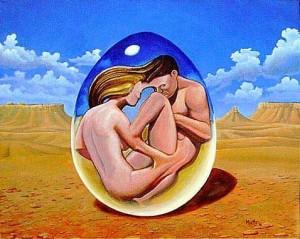Over the past few weeks I’ve been thinking about creation myths. By calling them “myths” it allows us to overlook, dismiss, or ignore them. This is a mistake. We should think hard about what these myths do and how they work. They are not just quaint relics of a pre-scientific past. They are not just stories to be studied as folklore. The universality of such myths is telling us something important about what it means to be human. People apparently need creation myths. Why?

Artist: Tim Mietty
Though there are undoubtedly other reasons, one of the most important surely is orientation. People need to situate themselves in both time and space. Creation myths serve this need: they provide a temporal and spatial anchor. This anchoring effect serves as a powerful reminder that views are never from nowhere. All views are situated. Though philosophers may aspire to the view from nowhere (which is the equivalent of the view from everywhere) this is beyond the capacity and interest of most. This aside, the idealistic and detached view from nowhere surely is an impossibility. All views are from somewhere and in many cases that somewhere is found in creation myths.
Because having a view requires a viewer or agent, the next reason which comes to mind is identity. As individuals, our identities are constructed through memory. This is the autobiographical self. As groups, our identities are likewise constructed through memories. This is the autobiographical culture. Whether dealing with individual memories or group histories, the things that are recalled need not traffic in truth. Indeed, much of what we recall is false. The stories we tell are part fact and part fiction, with varying amounts of each. The important thing is to construct a relatively stable identity. Creation myths serve this need.
While reading about creation myths and origins stories I recently came across this passage written by Roger Lewin:
Every society for which there are records has its version of the “origin myth,” where myth is used to mean allegory, not just fantasy. The product of the unique curiosity of the human mind, origin myths nevertheless tell more than how a particular people might have got here. They encompass a view of the world that tells people how they should behave now they are here. Origin myths are prescriptive, not just descriptive. They present a microcosm of society, of the way men relate with women, of the way “real people” relate with “foreigners,” and of the place of humans in the world of nature. It is not surprising, therefore, that ever since there evolved in the human mind that unique quality of conscious, of reflective self-awareness, origin myths have been central to the intellectual lives of Homo sapiens everywhere.
This is surely correct. It partially explains the incredible staying power of the Edenic myth and why it is defended with such vehemence. For believers, it’s not simply a matter of literalism and the interpretive license which flows from metaphorical readings.
The Edenic myth provides an orientation and identity which evolution apparently doesn’t. This is not to say that human evolution can’t provide orientation or identity, only that some find it profoundly unsettling and distasteful. It is one thing to be made in the image of God, quite another to be an evolving primate. The ontology and metaphysics which attach to Eden are perhaps more comfortable than those which come out of evolutionary Africa.
Reference:
Lewin, Roger (1988). Man’s Place in Nature The Missouri Review, 11 (3), 16-32


